In an effort to stop water erosion on hilly land, such as I
have on my farm, John Coombes planted black locust trees in the early 1940s. By
nature black locust trees have an extensive root system, they tolerate dry,
sandy soil and require no attention once planted.
Coombes, who owned this farm before us, was likely pleased
that the locust trees stopped further development of a huge gully that had
formed not far south of his buildings..
But the locust trees did not remain content in the gully,
and soon spread over several acres, growing tall and flourishing. The trees, although now becoming a menace,
did have their good points. I cut and
used them for fence posts—they resist rotting as well as red cedar. I have some that have been in the ground for
more than 30 years and they are still standing upright. And the mature trees, because they are in the
pea family, have beautiful, long, sweet smelling flowers that attract bees. Locust honey is special.
But enough about their good points. If left alone, much of my farm would now be
overgrown with black locust trees had we not declared war on them several years
ago, a fight that continues to this day.
We have cut them, sprayed them, and girdled them. And it seems, for each tree we remove, five
more replace it.
Last Saturday Steve and I, with shovel, logging chain and
ATV, staged yet another black locust battle.
We pulled several out by their roots, and what a root system they
have. One tree, no more than four feet
tall had a root that snaked through the ground for fifteen feet. Steve pulled, and pulled some more, until the
thin, tough snaky root was exposed. At
the end of it was another locust tree.
And in another three acre field, where we thought we had
killed every last locust tree, we discovered dozens, hundreds, who knows how
many tiny little locust trees that must have just emerged from the ground from
latent seeds. So the fight goes
one. We win a battle here and there, but
the black locusts are still winning the war.
The Old Timer was
recently asked: If you are doing nothing, how do you know when you’re done?
Writing From Your Life: A second Clearing Writing Class is scheduled
for Friday, October 28. Call 920-854-4088 to Register.
Upcoming Events:
August 9, 6:30 p.m. Winnebago
County Historical Society. Oshkosh
Library. History of Wisconsin
Agriculture.
August 12, 9-4, Writing Workshop,
The Clearing, Door County. (Filled)
August 20, 10:30-11:30 am. Waupaca Annual Arts on the Square. Story telling.
August 22, 7:00 p.m., Twin Cities
Public TV. Live appearance. The Land
With Jerry Apps
August 29, 7:00 p.m. Wisconsin Public
TV. The Land With Jerry Apps
August 30, 7:00 p.m. Milwaukee
Public TV. Live appearance. The Land With Jerry Apps
September
8, 7:00 p.m. McMillan Memorial Library,
Wisconsin Rapids. Workshop on memoir writing. Participants should have a copy
of TELLING YOUR STORY as it will be used in the workshop. Book will be
available for sale the evening of the workshop.
Purchase Jerry’s DVDS and his Books from the Patterson Memorial
Library in Wild Rose, Wisconsin (a fundraiser for them):
The library now has available signed copies of Jerry’s DVDs:
Emmy Winner, A
Farm Winter with Jerry Apps (based
on The Quiet Season book.)
Jerry Apps a Farm Story (based on Rural Wit and Wisdom and Old
Farm books.)
The Land with Jerry Apps, (based on the book Whispers and
Shadows.)
Also
available are several of Jerry’s signed books including: Jerry’s newest novel, The Great Sand Fracas of Ames
County. and Wisconsin
Agriculture: A History.
Jerry’s newest books, Roshara
Journal (with photos by Steve Apps) and Telling Your Story—a guide
book for those who want to write their stories—are also available.
Contact the library for prices and special package deals.
Patterson Memorial Library
500 Division Street

1 comment:
Jerry,
Our battle is with the lowly box-elder, about which my Dad would say, "Not worth a spit," or my German bachelor farmer uncle would substitute an h for the p in spit, regardless of who might be in hearing distance. At least the locust is useful for posts, haven't found anything box-elder is good for. I have always wondered why the tree diseases have wiped out the chestnut, elm, and are working on the ash, and beech, and leave the junk trees alone. Not fair!
Post a Comment